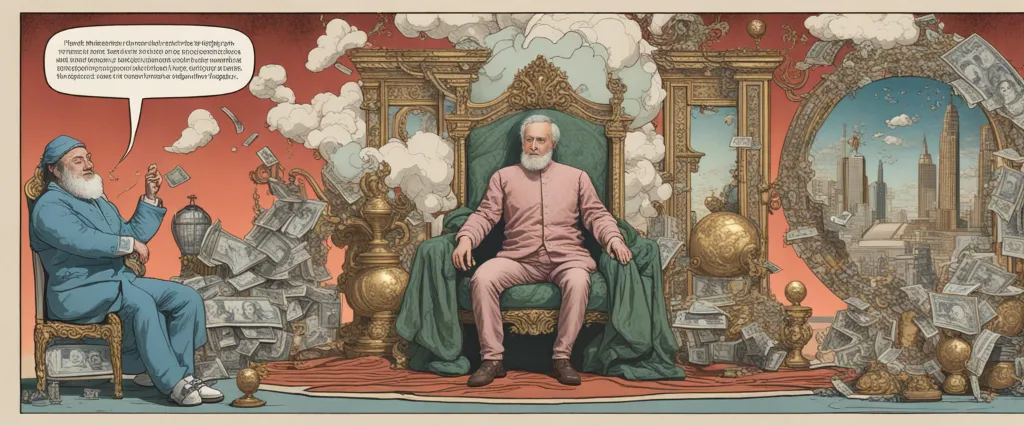——The Richest Man in Babylon by George S. Clason & The Millionaire Next Door by Thomas J. Stanley

In the realm of personal finance and wealth accumulation, two outstanding literary works have captured the attention of countless individuals seeking financial success – “The Richest Man in Babylon” by George S. Clason and “The Millionaire Next Door” by Thomas J. Stanley. These influential books delve deep into the realm of personal finance, providing invaluable insights and principles on how to achieve financial prosperity. While both books explore the subject matter with distinct perspectives, the fundamental message they convey aligns with the shared aspiration of attaining financial independence and abundance.
Published in 1926, “The Richest Man in Babylon” is a timeless classic that has withstood the test of time. Set in ancient Babylon, Clason’s book takes readers on a journey through parables and tales that highlight the timeless principles of wealth creation and management. Rooted in the simple yet profound message of saving a portion of one’s income and investing it wisely, the book imparts wisdom that remains as relevant today as it was almost a century ago. Clason’s ability to transform complex financial concepts into relatable stories offers readers a practical and engaging approach to acquiring financial intelligence.
In contrast, “The Millionaire Next Door,” written by Thomas J. Stanley, takes a more contemporary approach to understanding wealth in modern America. Published in 1996, Stanley explores the lives and habits of individuals who have successfully accumulated substantial wealth, debunking conventional notions of what it means to be rich. Through extensive research and analysis, Stanley presents the surprising revelation that the majority of millionaires are not the glamorous celebrities or high-profile entrepreneurs we often envision. Instead, they are regular individuals who have quietly accumulated wealth through diligent saving, wise investments, and living below their means. By examining the patterns and habits of these everyday millionaires, Stanley provides invaluable insights on how the average person can achieve financial independence.
While “The Richest Man in Babylon” and “The Millionaire Next Door” may differ in terms of historical context and narrative style, they converge in their emphasis on timeless financial principles. Both books underscore the importance of cultivating sound financial habits, learning to live within one’s means, and making prudent investment choices. By drawing attention to these essential tenets of wealth accumulation, Clason and Stanley provide readers with actionable steps to take control of their financial lives and shape a prosperous future.
In this comparative study, we aim to explore the overlapping themes, distinctive approaches, and unique strengths of these two literary masterpieces. By analyzing their core principles, capturing the essence of their narratives, and highlighting the impact they have had on readers worldwide, we will unveil the shared wisdom they offer while also examining the contrasting perspectives that make each book a powerful resource in its own right. Through our exploration, we hope to empower readers to make informed decisions about their personal finances and embark on a path towards lasting financial wealth and security.
Brief Summary of Two Books
The Richest Man in Babylon by George S. Clason
“The Richest Man in Babylon” by George S. Clason is a personal finance classic that offers ageless lessons on wealth accumulation and financial success through a collection of parables set in ancient Babylon. The book emphasizes the importance of saving, budgeting, and taking control of one’s financial future.
The main characters in the book, Bansir, Kobbi, and Arkad, among others, share their experiences and lessons learned on the path to becoming wealthy. Throughout the narratives, key principles such as paying oneself first, investing wisely, and effectively managing one’s money are emphasized as essential strategies for building wealth.
The book elucidates the powerful concept of money multiplying itself through strategic investment and compounding interest. Through engaging stories and practical advice, Clason promotes the principles of making one’s money work for them, rather than constantly working for money.
The Richest Man in Babylon” offers simple yet powerful insights into financial management and how to build wealth, regardless of income level. By following the lessons and applying the principles shared within its pages, readers gain valuable guidance on how to achieve financial independence and success in their own lives.
The Millionaire Next Door by Thomas J. Stanley
The Millionaire Next Door by Thomas J. Stanley is a non-fiction book that challenges the common perception of millionaires. Contrary to popular belief, the book argues that the majority of millionaires are not eccentric celebrities, athletes, or heirs of wealthy families. Instead, they are ordinary individuals who have amassed significant wealth through hard work, frugality, and smart financial choices.
Stanley and his research partner, William D. Danko, conducted an extensive study targeting America’s wealthy population. They discovered that most millionaires live below their means and prioritize financial independence over luxury and keeping up with societal expectations. The book presents seven key traits of these self-made millionaires:
1. They live well below their means: Millionaires tend to spend significantly less than their income allows, intentionally avoiding lavish lifestyles to accumulate wealth.
2. They prioritize financial independence: Wealthy individuals focus on building financial security rather than relying on high-paying jobs or get-rich-quick schemes.
3. They choose the right occupations: Many millionaires are self-employed, successfully running small businesses in industries often overlooked by others.
4. They are diligent savers and investors: Millionaires understand the value of saving and investing, consistently allocating a portion of their income towards investments that provide long-term growth.
5. They value education and continuous learning: Self-improvement plays a significant role in their financial success, with the majority of millionaires having a strong educational background.
6. They prioritize family and relationships: The book emphasizes the importance wealth builders place on maintaining strong family connections and raising children with financial discipline.
7. They are not driven by material possessions: Contrary to the belief that millionaires love to flaunt their wealth, the book reveals that many millionaires prefer to spend their money on experiences and investments rather than luxurious possessions.
The Millionaire Next Door offers insights into the habits, characteristics, and lifestyle choices that pave the way for financial success. By shedding light on the true nature of millionaires, it challenges readers to reevaluate their own financial attitudes, habits, and goals.
Comparison between Two Books

Similarities in Investing
Both The Richest Man in Babylon and The Millionaire Next Door share several similarities when it comes to their teachings on investing. Here are the similarities between the two books:
1. Importance of Saving and Delayed Gratification: Both books emphasize the significance of saving a portion of one’s income and prioritizing long-term financial goals over short-term indulgences. They advocate for delayed gratification as a key principle in building wealth and achieving financial independence.
2. Consistent and Systematic Investing: Both books stress the importance of consistency and discipline when it comes to investing. They advocate for regularly setting aside a portion of income for investment purposes, whether it is through stocks, real estate, or other opportunities. By consistently investing, individuals can harness the power of compounding and enjoy long-term wealth accumulation.
3. Diversification and Risk Management: Both books also highlight the importance of diversification and risk management in investment portfolios. They advocate for spreading investments across different asset classes to minimize risk and maximize potential returns. Additionally, they emphasize the need for individuals to educate themselves about investing and make informed decisions to avoid unnecessary risks.
4. Avoiding Get-Rich-Quick Schemes: The books caution against get-rich-quick schemes and highlight the importance of patience and prudence in investing. They emphasize the need for individuals to thoroughly research any investment opportunity, understand the associated risks, and avoid being swayed by promises of quick wealth.
5. Long-Term Approach: Both books recommend a long-term approach to investing. They emphasize the benefits of staying invested for a significant period, allowing investments to grow over time. By avoiding impulsive buying and selling based on short-term market fluctuations, individuals can achieve more consistent returns and build lasting wealth.
In summary, both The Richest Man in Babylon and The Millionaire Next Door align in their teachings on investing, emphasizing the importance of saving, consistent investing, diversification, risk management, and a patient, long-term approach. They both serve as valuable resources to guide individuals towards financial success and building wealth through smart investment strategies.
Divergences in Investing
The Richest Man in Babylon by George S. Clason and The Millionaire Next Door by Thomas J. Stanley are both popular financial books that offer insightful advice on building wealth and achieving financial success. While they share some similarities in their message of saving and frugality, they diverge in their approach and perspective when it comes to investing.
In The Richest Man in Babylon, Clason emphasizes the importance of investing as a means to grow one’s wealth. He introduces the concept of “paying yourself first” by allocating a portion of your earnings towards investments before spending on other expenses. Clason advocates for the power of compound interest and encourages readers to seek long-term investments that provide a steady income stream.
On the other hand, The Millionaire Next Door takes a more cautious approach to investing. Stanley argues that many millionaires build their wealth by living below their means and making wise financial decisions. He cautions against extravagant lifestyles and recommends that individuals invest in low-risk, high-return investments such as index funds. Stanley believes in a conservative investment strategy, focusing on wealth preservation rather than aggressive wealth accumulation.
The divergence in investing between these books can be seen in their attitude towards risk. Clason’s book promotes a mindset of taking calculated risks and investing in ventures that can yield substantial returns. He encourages readers to educate themselves about different investment opportunities and take action to grow their wealth. On the other hand, Stanley’s book focuses on minimizing risk and avoiding speculative investments that could jeopardize one’s financial stability.
Additionally, The Richest Man in Babylon emphasizes the importance of diversification in investments. Clason advises readers to spread their investments across different asset classes, such as real estate, stocks, or businesses. This diversification strategy aims to mitigate the risk associated with any single investment and maximize the potential for long-term growth.
In contrast, The Millionaire Next Door takes a more narrow approach to investing, suggesting that individuals should focus on a few investment options that they thoroughly understand and have historically performed well. Stanley’s book suggests that excessive diversification can dilute returns and recommends concentrating investments in areas of expertise.
In summary, while both books share the common goal of wealth creation and advocate for responsible financial habits, they differ in their approach to investing. The Richest Man in Babylon promotes a more aggressive and diversified investment strategy, while The Millionaire Next Door focuses on conservative and limited-risk investments. Ultimately, the choice of investing style depends on an individual’s risk tolerance, financial goals, and level of understanding of various investment opportunities.

Conclusion
Both The Richest Man in Babylon by George S. Clason and The Millionaire Next Door by Thomas J. Stanley are highly regarded and valuable books in the field of personal finance. However, the choice ultimately depends on the specific interests and goals of the individual reader.
The Richest Man in Babylon is a classic book that provides valuable financial advice through storytelling. It revolves around the ancient city of Babylon and offers timeless wisdom on saving, investing, and building wealth. The book focuses on the importance of financial discipline and living within one’s means. Readers who enjoy a narrative style and want to learn financial lessons through engaging storytelling might find this book more appealing.
On the other hand, The Millionaire Next Door takes a different approach. It is a research-based book that presents a comprehensive study of millionaires in America. The book explores the habits, characteristics, and behaviors of successful individuals who have accumulated significant wealth. It emphasizes the importance of frugality, budgeting, and income-generating investments. If you prefer a more data-driven and analytical approach to personal finance, this book might be the better choice.
Ultimately, both books offer valuable insights and lessons on wealth accumulation and financial success. It may be beneficial to read both and extract the knowledge that aligns with your personal financial goals and values.


